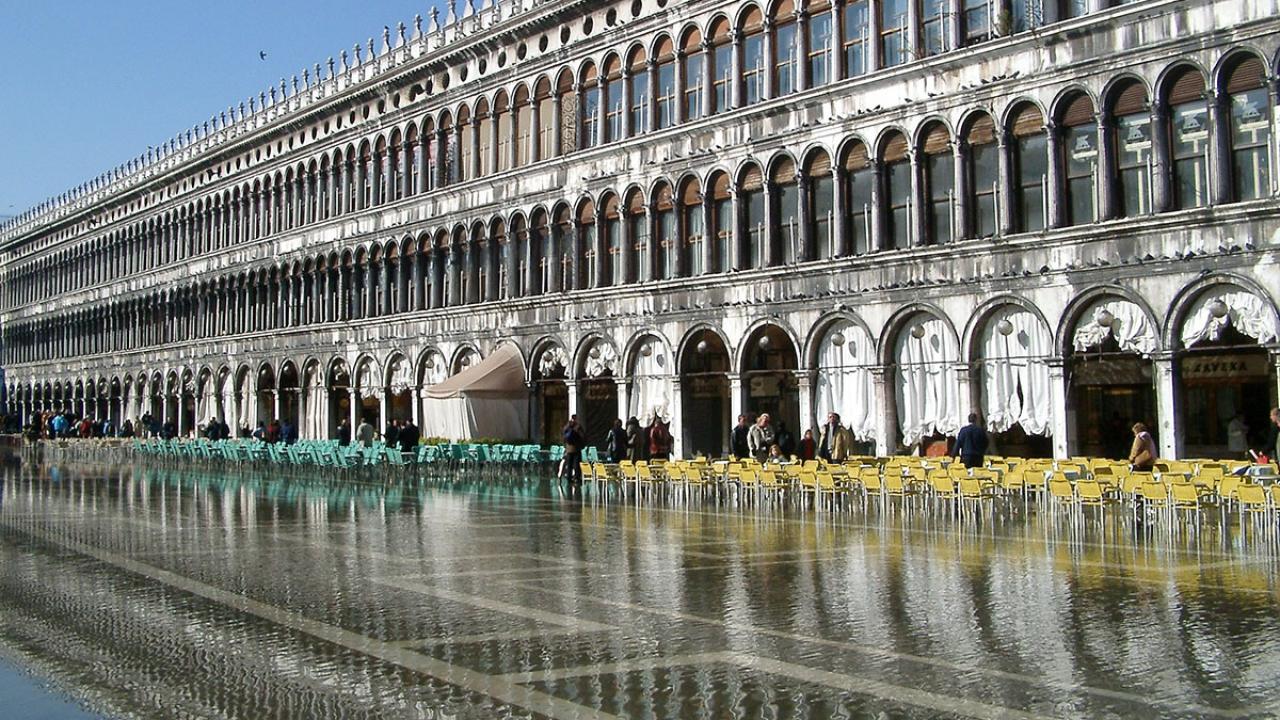
How can we effectively adapt to a changing climate and make our cities more resilient to extreme weather events? An international collaboration tried to answer this question by analysing the efficacy of an existing infrastructure: the MoSE flood barriers adopted by the city of Venice against Acqua Alta. The group was able to show that this facility has been effective in preventing potential floods from damaging the floating city even more.
Recent severe floods in Northern Italy have focussed public attention on the impact of climate change on extreme weather events. Anomalous and destructive high tides observed in Venice and Trieste also lead to question the impact of adaptation strategies, such as MoSE (Experimental Elecromechanical Module) in Venice, in mitigating the extensive damages that these events can provoke.
Numerous recent studies, some of which are cited in the United Nations Intergovernmental Panel on Climate Change (IPCC)’s regular reports, clearly show that the number and intensity of extreme weather events are likely caused by greenhouse gas emissions due to human activity and undeniably related to climate change. However, much is still unknown about the extent to which adaptation measures help us curb the harm caused by such extreme events.
Venice has been plagued with Acqua Alta more and more frequently in recent years, with catastrophic consequences on its economy and its cultural heritage. MoSE, which was completed in 2020, consists of a series of dams designed to protect the Venice lagoon against the water coming in from the Adriatic Sea, shielding Venice from floods. The efficacy of this costly project has often been questioned over the years, but its impact has not yet been systematically assessed.
That was the goal of a study recently published in npj Climate and Atmospheric Science [1], for which ICTP researcher Erika Coppola collaborated with Davide Faranda of Laboratoire des Sciences du Climat, the London Mathematical Laboratory, Laboratoire de Météorologie Dynamique at IPSL, Mireia Ginesta (Laboratoire des Sciences du Climat), Tommaso Alberti and Marco Anzidei, both at the Italian Institute of Geology and Volcanology.
The study proved that MoSE has been effective in reducing the damages caused by Acqua Alta. It referred to four particularly intense Acqua Alta events that took place in 1966, 2008, 2018 and 2019, and looked at the distribution of analogous incidents, characterised by similar sea level pressure, winds and precipitation patterns. The events were divided into two large sub-categories, depending on their year of occurrence: the first included events that happened between 1950 and 1979, the second focussed on the time range between 1993 and 2022. The theoretical framework used in this study also underlies the ClimaMeter platform developed by some of the same researchers to estimate the impact of climate change on extreme weather events.
“That climate change is one of the main drivers of increasingly frequent storm surge events is confirmed by the difference in the two distributions of analogues of Acqua Alta events between these two periods,” explained Coppola, a research scientist in ICTP’s Earth System Physics section.
“By using a simple model to relate the sea level and the flooded area to the disruption provoked in the absence of adaptation strategies, we compared the extent of damage with and without MoSE, and were able to estimate its effectiveness in protecting Venice from potential wreckage,” said Coppola. The authors thus showed that the MoSE system has been a valuable asset in shielding the city against events analogues of historical Acqua Alta episodes, particularly those similar to the catastrophic 1966 flood.
Additional data is needed to develop a more comprehensive assessment of MoSE and to inform the design of future adaptation measures, but these results constitute a crucial step towards a better understanding of the repercussions of extreme meteorological events and of the potential power of adaptability measures in making coastal cities more resilient.
[1] Faranda, D., Ginesta, M., Alberti, T., Coppola E., Anzidei, M. Attributing Venice Acqua Alta events to a changing climate and evaluating the efficacy of MoSE adaptation strategy. npj Clim Atmos Sci 6, 181 (2023). https://doi.org/10.1038/s41612-023-00513-0
















